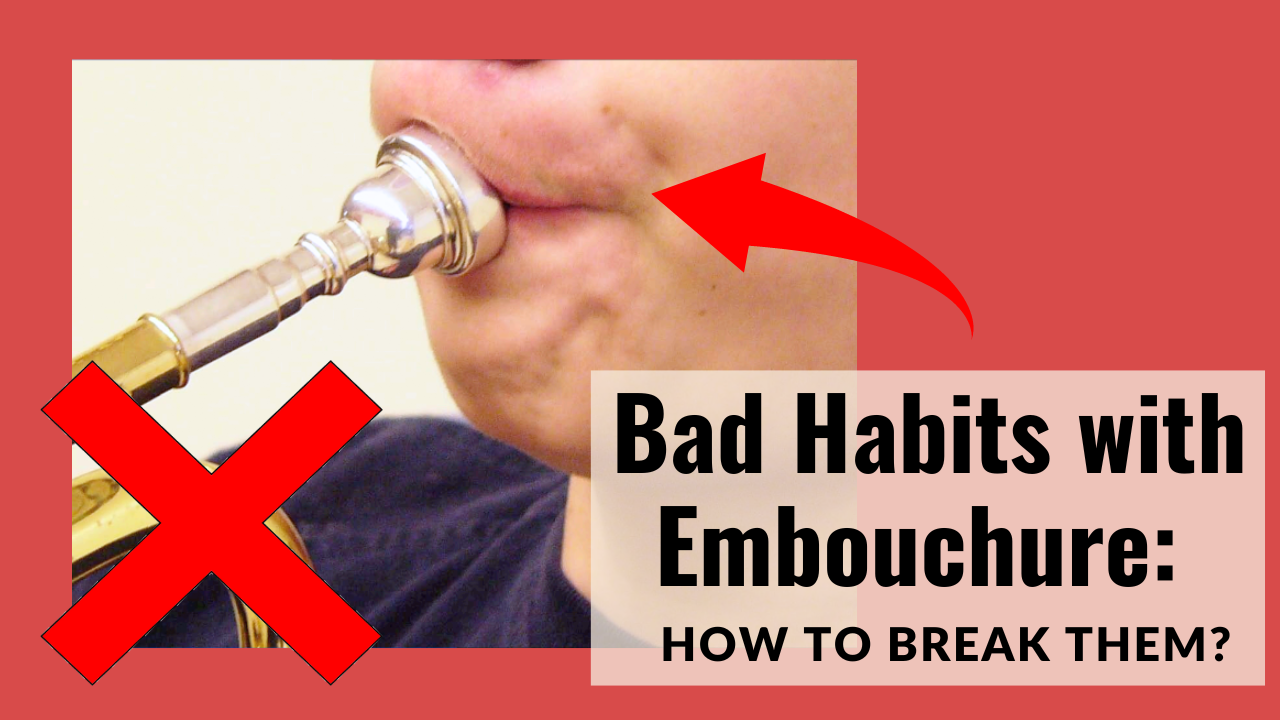Embouchure is the French term, used to describe the placement of the lips, tongue, and teeth of wind musicians while playing instruments. In other words, it’s the way you use lips and the muscles in your mouth to vibrate in the mouthpiece and produce the sound.
A correct and good embouchure is an essential part of mastering the trumpet. Various instruments require different techniques, however it’s definitely not something you can neglect, especially when you play a trumpet, which requires a stronger embouchure than other instruments.
How Does Poor Embouchure Affect Playing?
A poor embouchure can spoil a musician’s performance in many ways:
- Incorrect positioning of lips may lead to a thin, pinched, or airy sound.
- Without controlled airflow, the sound loses its resonance, fullness and vibrancy.
- Musician struggles with reaching higher notes, often playing them out of tune.
- Problems with the lower register, resulting in less stable and poor sound.
- Rapid muscle fatigue due to the overworking of the facial muscles, which leads to shorter practices and sessions.
- Musician struggles with sustaining long phrases and maintaining consistent performance.
- Playing sixteenth notes becomes a challenge because they require brief blasts of powerful air.
How to Develop the Proper Embouchure?
Lips position
The lips should form a seal around the mouthpiece of the instrument. You can do it by keeping the corners of the mouth firm and the center flexible. Form your lips in a way you pronounce “mmm”.
Teeth position
Your top and bottom row of teeth should be slightly apart to allow the lips to vibrate freely.
Jaw position
Your jaw must remain relaxed and positioned slightly forward to maintain a steady airflow.

What’s next?
- Pull the corners of your mouth apart. You will feel tension in your cheeks. However, don’t curve your mouth like smiling. If you see a curved vertical line on each side of your mouth, it means you’re doing it in a right way.
- Blow air through your lips, keeping the tension. Part the lips a bit to form an opening in your lips, known as “aperture”. Pay attention to the front part of your chin, as it should remain in a flat position without bunching up or rounding outward. This is somewhat like blowing into a hot dish.
- Close the opening in your lips as you blow the air until your lips start to vibrate and create a buzzing sound. It’s okay if you experience resistance from your lips as well as a slight itching or tickling. The buzzing sound proves that you do it right. Use deep breaths from the diaphragm to produce a steady airflow.
- Lick your lips to moisturize them. Don’t overdo with it, as too much moisture can make the mouthpiece slip over your mouth.
- Remove the mouthpiece from your instrument, bring it to your mouth and gently press it to your lips. Place it in a way when its center aligns with the center of the lips vertically and horizontally. The rim should comfortably rest on the inner edge of the top lip. The lower lip should slightly overlap the bottom edge of the mouthpiece for better stability and control. In case of musicians with slight asymmetry in their mouth or strong overbite, the mouthpiece can be positioned slightly off-center.
- Blow air into the mouthpiece. The opening between your lips should be small for a better control over the airflow. Slowly make the opening narrower until you hear a buzzing sound coming from the mouthpiece. Now it should sound very close to the sound of the instrument.
- Insert the mouthpiece in your trumpet, bring it to your lips and blow into it. Keep the trumpet parallel to the floor and slightly angled downward.
Bad Habits with Embouchure: How to break them?
Blowing with dry lips
Lubricated lips are essential for correct vibration in the mouthpiece. With dried lips, you may find it challenging and what’s more, it increases the likelihood of hurting your lips.
Tension in muscles
Your facial muscles must be relaxed, otherwise you may experience bad tone quality and bad endurance. When you strain any of your facial muscles for prolonged period, it will lead to painful sensation.
Puffing out the cheeks
Many musicians struggle with this habit. When you puff the cheeks, it allows you to force air through the instrument more quickly. However, it may lead to the tiredness and soreness in your mouth. To break this habit, you should train your mouth muscles and control the force of your airstream.
Applying excessive pressure on lips
One of the most common challenges the musicians face is pressing the mouthpiece too hard against the lips. This bad habit restricts airflow and cause fatigue. Moreover, regular pressing can damage the lips, leading to injuries and bloody wounds.
To solve this problem, use an optimizer. This device is designed to break the habit of applying excessive mouthpiece pressure during practice. Its system activates as soon as the mouthpiece is forced against the lips too hard, so you can control your playing and build a proper embouchure.
Another tool you can use to develop a correct embouchure is T.E.T. Designed for beginners, this trumpet embouchure trainer improves lips function and trains muscles responsible for producing the sound. It also helps you get a better control of the airflow. T.E.T. works well for warm-ups, lip buzz exercises, working on the breath and the correct playing position from the physical point of view.
Final Word
The role of the proper embouchure is something you can’t underestimate when you start to play a wind instrument. A correct embouchure helps you to play notes from higher and upper registers effortlessly, perform pieces for a long time without fatigue and express yourself through beautiful music.
Do you want to learn more about playing a trumpet? We have helpful articles about the anatomy of the trumpet and care and maintenance guide to help you maintain your instrument in excellent condition.
Check out our limited time offers to buy accessories for brass and woodwind instruments at special prices.





 https://kgumusic.com/pages/about-us
https://kgumusic.com/pages/about-us
2 comments
Very good information. Consistency and breaks I find to also be very important. Thanks for this!
Very educative